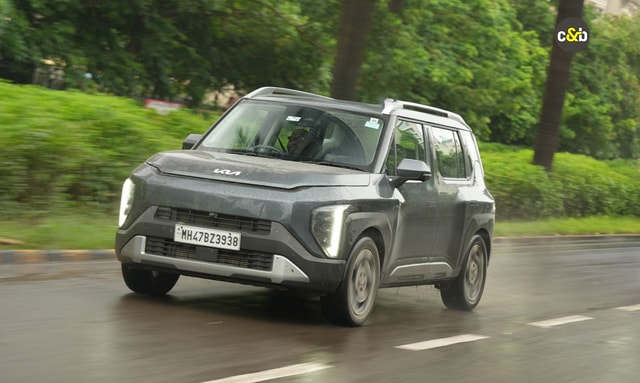FIA Announces New Mandatory Helmet Standards For Formula 1

The Federation Internationale de l'Automobile (FIA) has revealed new standards for helmets in Formula 1 that will be mandated from 2019. The new helmet standards have been developed after a decade of research and offer improved safety to the driver including ballistic protection and increased energy absorption over the current helmets on offer. Starting with F1 next season, the new helmet standards will be implemented across other championships as well, the governing body announced earlier this week. The current helmets used in F1 are the best in motorsport safety and it's only encouraging to see new strides being taken to improve driver protection in the high octane sport.
The FIA says that the new helmet standards have been put into effect after working with helmet manufacturers including Still, Bell Racing, Schuberth and Arai during the research phase. The 2019 helmets fall under the new FIA 8860-2018 standards. As part of the upgrades, the new helmet now comes with the visor lowered by 10 mm to incorporate advanced ballistic protection. The FIA says this "achieves unprecedented levels of safety during impact from debris."
The shell construction now uses advanced composite materials to ensure resistance to crushing and penetration. The protection on sides has been extended to offer better compatibility with new single-seater headrests and closed car seat-side head protection systems. This ensures energy management is exactly where the headrests are positioned.
The new helmets have been through vigorous tests including variable crash speeds to account for different accidents and a range of weights to account for different mass headforms.

(The FIA worked with several helmet manufacturers including Bell, Still, Schuberth and Arai)
Speaking on the new helmet standards, the FIA safety director, Laurent Mekies said, "The current top-end helmets are already the safest in the world but the new standard will take them to the next level. It is important for all of our safety research that we continually strive to improve and this is why we are requiring all manufacturers to meet this tougher standard for our championships."
Under the new FIA 8860-2018 standard, all helmets must withstand the following tests:
- Standard impact: Helmet impact at 9.5m/s. Peak deceleration on 'driver's head' shall not exceed 275G.
- Low velocity impact: Helmet impact at 6 m/s. Peak deceleration shall not exceed 200G with a maximum average of 180g.
- Low lateral impact: Helmet impact at 8.5 m/s. Peak deceleration shall not exceed 275G.
- Advanced Ballistic Protection: A 225g metal projectile fired at 250km/h. The peak deceleration shall not exceed 275G.
- Crush: A 10kg weight falling 5.1 metres onto helmet. Lateral and longitudinal tests. The transmitted force should not exceed 10 kN.
- Shell penetration: A 4kg impactor dropped onto helmet at 7.7 m/s.
- Visor penetration: Air rifle fires 1.2g pellet at visor. Pellet must not penetrate the interior of the helmet.
- Visor coating: Transmitter test to ensure colouration and vision is not significantly changed or distorted.
- Retention system: Roll-off test and dynamic test to ensure strength of chin strap and its attachments.
- Chin guard linear impact: Impact test with full headform at 5.5m/s. The peak deceleration shall not exceed 275G.
- Chin guard crush: Hammer hits chin guard and measures ability to keep impact away from the head.
- FHR mechanical strength: Test to ensure high strength of attachment points for Frontal Head Restraints.
- Projection and surface friction: Test to ensure helmet surface uniformity and that friction is minimised. Shell surface also subjected to BARCOL hardness test for resistance to penetration.
- Flammability: Helmet exposed to 790 degrees celcius flame; it must self-extinguish once flame is removed.
Latest News
 car&bike Team | Jan 19, 2026Skoda Kushaq Facelift Debut Tomorrow: What To ExpectFacelifted Kushaq to get updated looks and new tech inside the cabin.1 min read
car&bike Team | Jan 19, 2026Skoda Kushaq Facelift Debut Tomorrow: What To ExpectFacelifted Kushaq to get updated looks and new tech inside the cabin.1 min read Jaiveer Mehra | Jan 17, 20262026 Tata Punch Facelift Price, Variants ExplainedUpdated Punch is available in 8 trim levels with naturally aspirated petrol, CNG and turbo-petrol engine options.3 mins read
Jaiveer Mehra | Jan 17, 20262026 Tata Punch Facelift Price, Variants ExplainedUpdated Punch is available in 8 trim levels with naturally aspirated petrol, CNG and turbo-petrol engine options.3 mins read car&bike Team | Jan 17, 2026Skoda Kushaq Facelift Teased Ahead of Launch In Coming WeeksMid-lifecycle update to bring with it styling updates as well as new features inside the cabin.1 min read
car&bike Team | Jan 17, 2026Skoda Kushaq Facelift Teased Ahead of Launch In Coming WeeksMid-lifecycle update to bring with it styling updates as well as new features inside the cabin.1 min read car&bike Team | Jan 16, 2026Pierer Mobility AG Rebranded as Bajaj Mobility AG Following KTM TakeoverThis marks a major shift in ownership and strategic direction in the global motorcycle industry.1 min read
car&bike Team | Jan 16, 2026Pierer Mobility AG Rebranded as Bajaj Mobility AG Following KTM TakeoverThis marks a major shift in ownership and strategic direction in the global motorcycle industry.1 min read Seshan Vijayraghvan | Jan 16, 2026Kia Syros Variant Line-Up Expanded With HTK (EX) Trim; Prices Start At Rs. 9.89 LakhPositioned between the HTK (O) and HTK+ trims, the new variant will be offered in both petrol and diesel options.2 mins read
Seshan Vijayraghvan | Jan 16, 2026Kia Syros Variant Line-Up Expanded With HTK (EX) Trim; Prices Start At Rs. 9.89 LakhPositioned between the HTK (O) and HTK+ trims, the new variant will be offered in both petrol and diesel options.2 mins read car&bike Team | Jan 16, 2026MG Majestor India Launch On February 12Unveiled in India at the 2025 Bharat Mobility Expo, the Majestor is expected to be positioned as a more premium alternative to the Gloster.1 min read
car&bike Team | Jan 16, 2026MG Majestor India Launch On February 12Unveiled in India at the 2025 Bharat Mobility Expo, the Majestor is expected to be positioned as a more premium alternative to the Gloster.1 min read
 Amaan Ahmed | Jan 17, 2026Bajaj Chetak C25 First Ride Review: Basic, Likeable E-Scooter For First-Time RidersThe Chetak C25, in quite a few ways, is poles apart from the larger and more powerful 30 and 35 Series models, but in its mannerisms, it is very much a Chetak.8 mins read
Amaan Ahmed | Jan 17, 2026Bajaj Chetak C25 First Ride Review: Basic, Likeable E-Scooter For First-Time RidersThe Chetak C25, in quite a few ways, is poles apart from the larger and more powerful 30 and 35 Series models, but in its mannerisms, it is very much a Chetak.8 mins read Bilal Firfiray | Jan 9, 2026Toyota Urban Cruiser Hyryder: 10,000 km Long-Term ReviewAfter spending over three months and 10,000 km with the Toyota Urban Cruiser Hyryder Hybrid, we were impressed by its real-world mileage, seamless hybrid, practical comfort, and Toyota reliability. Is it the best C-SUV then?5 mins read
Bilal Firfiray | Jan 9, 2026Toyota Urban Cruiser Hyryder: 10,000 km Long-Term ReviewAfter spending over three months and 10,000 km with the Toyota Urban Cruiser Hyryder Hybrid, we were impressed by its real-world mileage, seamless hybrid, practical comfort, and Toyota reliability. Is it the best C-SUV then?5 mins read Seshan Vijayraghvan | Jan 8, 20262026 Mahindra XUV 7XO Review: Big On Tech, Bigger On ComfortThe new Mahindra XUV 7XO is flashier, feature packed, and comes with more advanced tech. But are the changes just incremental or actually substantial?1 min read
Seshan Vijayraghvan | Jan 8, 20262026 Mahindra XUV 7XO Review: Big On Tech, Bigger On ComfortThe new Mahindra XUV 7XO is flashier, feature packed, and comes with more advanced tech. But are the changes just incremental or actually substantial?1 min read Preetam Bora | Jan 10, 2026Simple One Gen 2 First Ride Review: 265 km Claimed Range!The Gen 2 model of Simple Energy’s first electric scooter gets a fair few updates, including new features, tech, more range and lighter weight. We spent a couple of hours with the Simple One Gen 2 to find out if it manages to impress.6 mins read
Preetam Bora | Jan 10, 2026Simple One Gen 2 First Ride Review: 265 km Claimed Range!The Gen 2 model of Simple Energy’s first electric scooter gets a fair few updates, including new features, tech, more range and lighter weight. We spent a couple of hours with the Simple One Gen 2 to find out if it manages to impress.6 mins read Amaan Ahmed | Jan 3, 2026VLF Mobster 135 300 KM Review: Fun But FlawedA 125 cc scooter with Italian design and Chinese genes is a rare combination, and while some may be tempted to dismiss it because of its origins, the VLF Mobster shows 125s can also be exciting – but not without compromises.11 mins read
Amaan Ahmed | Jan 3, 2026VLF Mobster 135 300 KM Review: Fun But FlawedA 125 cc scooter with Italian design and Chinese genes is a rare combination, and while some may be tempted to dismiss it because of its origins, the VLF Mobster shows 125s can also be exciting – but not without compromises.11 mins read






















































































































